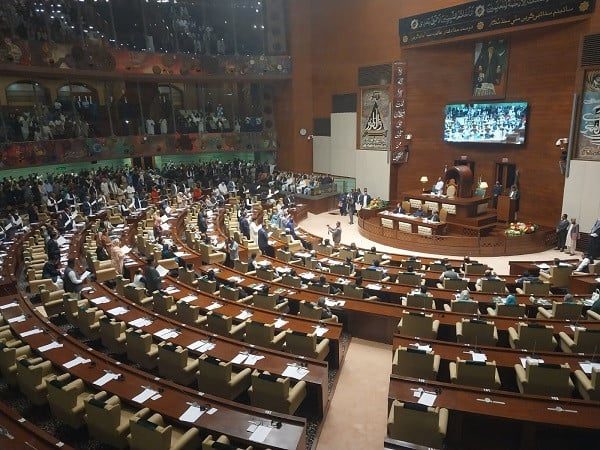Lanjar underscored the necessity of adhering to Article 202A, sub-clause 6, of the Constitution, emphasizing that fulfilling this constitutional requirement was imperative for the Sindh Assembly

By our correspondent
KARACHI: On Monday, the Sindh Assembly made a significant move by passing a resolution supporting the establishment of constitutional benches in the province, a step mandated by the 26th Constitutional Amendment. The resolution, presented by Home Minister Ziaul Hassan Lanjar, received overwhelming backing, securing 123 votes in favor. This support was notable, as it came from members across party lines, particularly the Muttahida Qaumi Movement (MQM) and the Pakistan Peoples Party (PPP), while opposition was voiced by members from the Pakistan Tehreek-e-Insaf (PTI) and Jamaat-e-Islami, including leader Muhammad Farooq.
Lanjar highlighted the importance of complying with Article 202A, sub-clause 6, of the Constitution, which emphasizes the need for provincial assemblies to act in accordance with constitutional requirements. During the assembly session, Sindh Chief Minister Murad Ali Shah spoke about recent amendments to relevant laws and urged members to familiarize themselves with procedural rules. He pointed out that while the resolution required a minimum of 85 members’ support, the lack of prior notice for its introduction should not be viewed as a violation of assembly regulations.
Under the framework set forth by the 26th Amendment, provincial assemblies are empowered to pass resolutions that facilitate the formation of constitutional benches in their respective high courts. Shah called upon other provinces to follow Sindh’s lead, emphasizing the need for expedited justice and strict adherence to constitutional obligations. Additionally, the Chief Minister credited the draft provisions related to constitutional benches in the 26th Amendment to PPP Chairman Bilawal Bhutto Zardari, underlining the collaborative efforts that have shaped this resolution.
As the political dynamics in Pakistan continue to evolve, the passage of this resolution highlights the ongoing debates surrounding judicial reform and the crucial role of provincial assemblies in upholding constitutional mandates. This development not only aims to enhance the judicial process but also reflects the assembly’s commitment to fulfilling its constitutional responsibilities amidst a changing political landscape.



